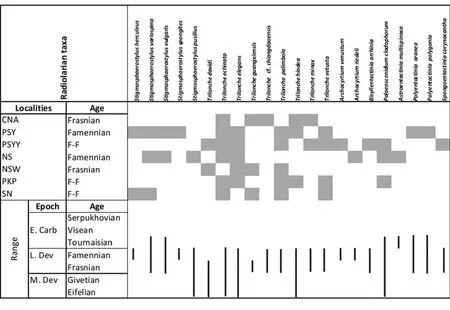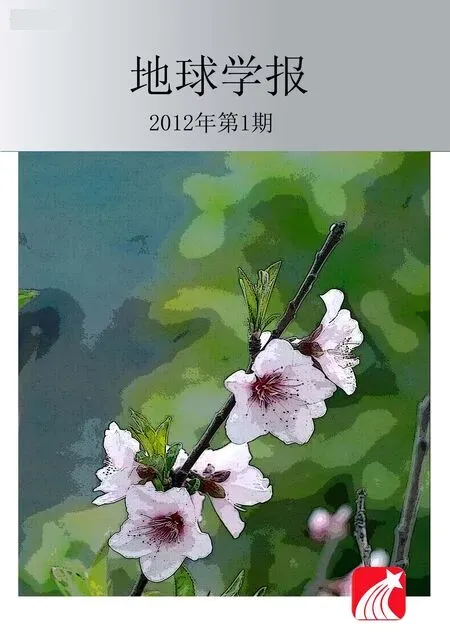印支地体泥盆纪牙形石、放射虫和竹节石组合
2012-09-20HATHAITHIPTHASSANAPAK,MONGKOLUDCHACHON,CLIVEBURRETT
印支地体泥盆纪牙形石、放射虫和竹节石组合
E-mail: bthaithip@yahoo.com.
Devonian faunas including conodonts, radiolarians, tentaculitids and other important fossils have recently been found at several localities in the Indochina Terrane. These faunas are biostratigraphically and tectonically important.
In the eastern margin of the Indochina Terrane along the Troungson Foldbelt in central Laos, the Ban Phonxai and Vilaburi localities, located in Lak Xao and Sepon districts, respectively contain the radiolariansTrilonche davidi,T. hindea,T. minax,T.palimbola,Stigmosphaerostylusspp., andCeratoikiscum? sp., and the tentaculitidsHomoctenus ultimusandCostulatostylionina vesca. These fossils indicate a Frasnian age.
In the western margin of the Indochina Terrane,the occurrence of Late Devonian radiolarian cherts at Pak Chom in Loei province was first reported by Sashida et al. (1993) and detailed taxonomic work on Late Devonian-Early Carboniferous radiolarians was carried out from collections along the bank of the Mekong by Seasaengseerung et al., (2005). Recently,we have observed Frasnian to Famennian radiolarian chert sequences from several localities in the south of the Pak Chom. Radiolarians obtained from the cherts includeAstroentactinia multispinosa(Won),Trilonche davidi(Hinde),T. echinata(Hinde),T. elegansHinde,T. guangxiensis(Li & Wang),T.cf.chiangdaoensis(Wonganan & Caridroit),T. palimbola(Foreman),T.hindea(Hinde),T. minax(Hinde),T. vetustaHinde,T.sp.,Triaenosphaerasp.,Astroentactiniasp.,Bisyllentactinia arrhinia(Foreman),Palaeoscenidium cladophorumDeflandre,P.sp.,Polyentactinia araneaGourmelon,Polyentactiniasp.,Holoeciscussp.,Ceratoisicumsp.,Albaillellasp.,Deflantricasp.,Tle-cerinasp.,Archocyrtium venustumCheng,Stigmosphaerostylus herculean(Foreman),S. variospina(Won),S. vulgarisWon, andS.sp. In CNA locality(Fig. 1), radiolarians were observed with conodonts which are also significant biostratigraphically. These co-occurring conodonts includePalmatolepisspp. andPolygnathusspp. which indicate a Frasnian age for the chert sequence.Polynathus linguiliformisssp. andIcriodusspp. of Givetian age are found in thin-bedded limestone which is conformably overlain by small stromatoporoid-coral reefs.

Fig. 1 Late Devonian radiolarian assemblage from Loei, Thailand
This widespread pelagic, deep shelf fauna from the Indochina Terrane is similar to that from South China and shows that tentaculitids and conodonts may both be common and biostratigraphically useful in radiolarian cherts and shales in South East Asia.
Devonian Conodont, Radiolarian, and Tentaculitid Assemblages in the Indochina Terrane
Hathaithip THASSANAPAK1), Mongkol UDCHACHON2), Clive BURRETT1,3)
1)Palaeontological Research and Education Centre, Mahasarakham University, Mahasarakham,44150,Thailand;
2)Department of Biology, Faculty of Science, Mahasarakham University, Mahasarakham,44150,Thailand;
3)School of Earth Sciences, University of Tasmania, Box 252–79, Hobart, Tasmania,7001,Australia
Devonian; Conodont; Radiolarian; Tentaculitid; Indochina
10.3975/cagsb.2012.s1.29
